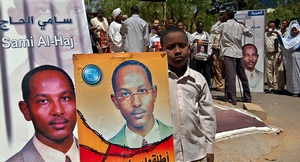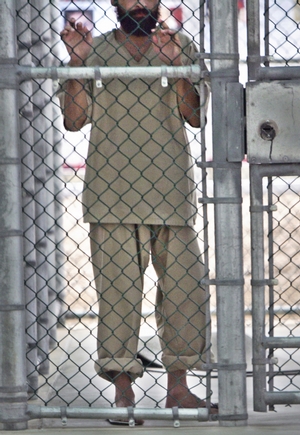Four months ago Al Jazeera journalist Sami al-Hajj (39) was released after six years in Guantanamo Bay. Now he tells his story.
 xxx  Sami al-Hajj was released in may 2008, after five years on Guantanamo. Photo: Scanpix  xxx  The sixteen days at Bagram has been described by Sami al Hajj as “the worst of my life”. Photo: Scanpix |
“A few months ago, even thinking of attending such a gathering was just beyond imagination”, says Sami al-Hajj to GIJC Magazine.
In his opening speech in Lillehammer Sami al- Hajj will tell the story of a journalist who spent six years of his life in total isolation without charge.
“I will try to expose the multi-faceted suffering of hundreds of human beings and the inhumane conditions they live in that remote part of the world”, says al-Hajj.
The end of a nightmare
On May 2nd 2008 a US air force plane landed in the airport of Sudan’s capital Khartoum. Guantanamo internee number 345, Sami al-Hajj, was carried off the plane on a stretcher, and brought straight into hospital.
He was a free man, but hardly recognizable. He was ill, and he had lost more than 20 kilos from a 17 months long hunger strike. He had been force-fed through his nostrils, twice a day.
According to psychologists and his lawyers he suffered from acute depression and “passive suicide”, a condition where an individual loses his will to live. Sami al-Hajj is the only journalist to have been held a prisoner without charge or trial at the US Guantanamo Bay detainment camps.
“Undoubtedly, regaining freedom is a unique experience. To be with my family, bringing up my child who was only one and a half years when I left him is amazing. He is now eight years of age and growing fast”, says al-Hajj.
Torture at Bagram
Al-Hajjs nightmare started in December 2001, in Pakistan, near the Afghan border. Only three months after the 9/11 attacks in New York and Washington had triggered the US “war on terror”, cameraman Sami al-Hajj was stopped by Pakistani police near the Afghan border.
Al-Hajj was on his way to report on the American war against the Taliban inside Afghanistan. The assignment was given to him by his employer, the television station Al-Jazeera, and he carried a work visa to enter Afghanistan.
He was never to carry out the assignment. Al-Hajj was the only one from the crew to be arrested, allegedly because his name and passport number appeared on a list from Pakistani intelligence. After three weeks he was transferred to US custody, and taken to Bagram airbase in Afghanistan.
The sixteen days at Bagram has been described by Sami al Hajj as “the worst of my life”. According to Amnesty reports he was attacked by military dogs, was locked into a cage and given very little and frozen food. The US accused Al-Hajj of links to a terrorist network.
Al-Jazeera, his employer, argued that al-Hajj had reported the passport in question stolen two years earlier and that anything done with the passport after that date is likely to be the work of identity thieves. On June 13. 2002 al-Hajj was transferred to Guantanamo Bay, where he spent the next six years of his life.
Accusations Sami al Hajj was declared “enemy combatant” and was accused of having provided support to Moslem fighters in Bosnia and Chechnya while working at a Qatar-based beverage company during the 1990s. Also his accusers alleged that he’d been travelling to Azerbaijan handing over money to terrorist groups.
Al-Hajj’s lawyers have all the way denied these allegations. Sami al-Hajj reports of constant interrogations about possible links between his former employer and Islamic extremists. He also describes a range of ill-treatments including being beaten by guards, deprivation of sleep and racist abuse.
A number of people and international organizations appealed for al-Hajj’s release and his right to a fair trial, including International Federation of Journalists, Amnesty International and Reporters without borders, as well as Al-Jazeera and several Sudanese politicians. Four months after his release Al-Hajj is back working for the Al-Jazeera in Doha, Qatar, currently heading the newly created ”Liberties and Human Rights Affairs” desk, which is to be launched very soon.
Meanwhile he travels to Lillehammer, Norway to share his story with hundreds of journalists from all over the world.
“A conference on journalism gives us the opportunity to tell our own story and focus on our profession that we need to look at from time to time. Journalists are usually absorbed in the immediacy of events and sometimes forget about real issues that might endanger journalism as a profession”, says Sami al-Hajj.
Additional sources: Wikipedia, New York Times Magazine, aljazeera.net, Amnesty International.

